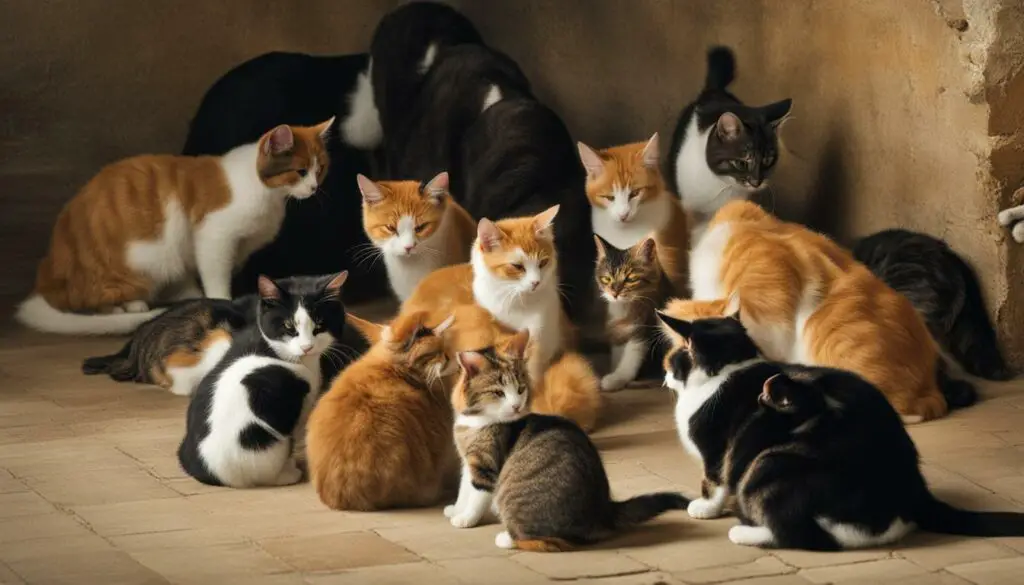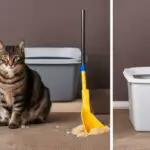Cats have always fascinated us with their mysterious ways and unique behaviors. As cat owners, we often wonder if our furry friends can sense and understand when one of their companions is nearing the end of their life. It’s a question that tugs at our heartstrings and begs for a deeper understanding of feline perception and emotional connections.
In this article, I will delve into the fascinating world of cat behavior and explore whether cats have the ability to know when another cat is dying. We will unravel the intricacies of their emotional connections and analyze the signs of decline in cats. Additionally, I will provide valuable insights on how to support your cat’s health and well-being during these challenging times, including the importance of veterinary care.
Key Takeaways:
- Do cats have the ability to sense when another cat is dying?
- Cats form deep emotional connections with their feline companions.
- Signs of decline in cats can include changes in appetite, weight loss, and lethargy.
- Grieving is a natural response for cats after the loss of a companion.
- Supporting grieving cats involves providing comfort and maintaining routines.
The Emotional Connection Among Cats
Cats are fascinating creatures that possess a unique ability to form deep emotional connections with one another. Their understanding and empathy towards fellow feline companions are truly remarkable. Through various forms of feline communication, such as body language, vocalizations, and scent markings, cats establish and maintain a strong emotional bond with their social group.
Feline communication plays a vital role in how cats perceive and react to the illness or death of another cat within their social circle. This emotional connection allows them to sense changes in their companion’s behavior and well-being, providing them with cues to navigate through difficult situations. Cats can exhibit remarkable empathy, understanding when their fellow feline is in distress or experiencing health issues.
Understanding the emotional connection among cats is crucial for comprehending how they perceive and respond to the loss of a companion. It highlights the significance of providing them with the necessary support and care during these challenging times. By acknowledging their emotional intelligence and social behavior, we can better assist grieving cats in coping with the loss of a feline friend.
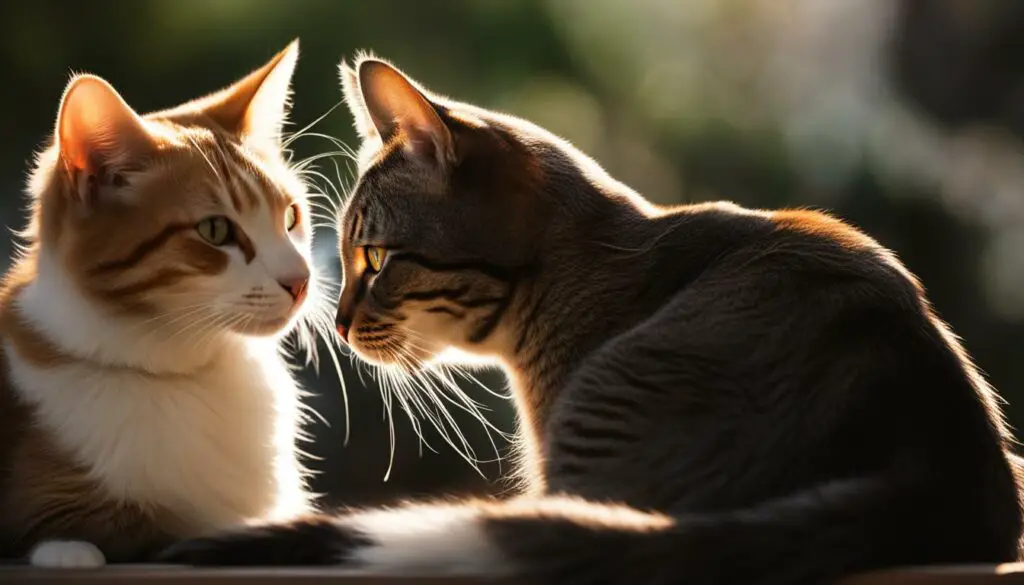
Table: Forms of Feline Communication
| Form of Communication | Description |
|---|---|
| Body Language | Cats use body postures, facial expressions, and tail movements to convey various messages, including emotions and intentions. |
| Vocalizations | Cats produce a wide range of vocalizations, such as meowing, purring, hissing, and growling, to communicate their needs, emotions, and warnings. |
| Scent Markings | Cats use scent markings from glands on their face, paws, and tail to establish territory, communicate social status, and recognize familiar individuals within their group. |
The emotional connection among cats is a testament to their rich social lives and the complexity of their interactions. It reminds us of the profound bonds they form with their fellow felines and the importance of acknowledging and supporting them during times of loss and grief.
Recognizing Signs of Decline in Cats
When it comes to our beloved feline companions, it’s important to be vigilant and proactive in monitoring their health. Cats can be masters at hiding signs of illness or decline, making it crucial for us to recognize the subtle changes that may indicate a problem. By being observant and knowing what to look for, we can ensure that our cats receive the necessary care and attention they need.
One of the key signs of decline in cats is a change in appetite. Cats who are not feeling well may show a decrease in their food intake or even a complete loss of appetite. It’s important to monitor their eating habits and consult with a veterinarian if there are significant changes in their appetite.
Weight loss can also be an indication of a decline in a cat’s health. If you notice that your cat is losing weight despite having a normal or increased appetite, it may be cause for concern. Sudden weight loss or a noticeable change in body condition should prompt a visit to the veterinarian to rule out any underlying medical conditions.
| Signs of Decline in Cats | Description |
|---|---|
| Changes in appetite | Decreased food intake or loss of appetite |
| Weight loss | Noticeable decrease in body weight |
| Lethargy | Reduced activity levels and increased sleep |
| Decreased grooming | Less time spent grooming their fur |
| Changes in litter box habits | Altered frequency or location of urination/defecation |
Lethargy is another common sign of decline in cats. If your normally active and playful cat becomes lethargic and spends increased time sleeping, it may be an indication that something is wrong.
Lastly, changes in litter box habits can also be a red flag. Cats who are not feeling well may alter their litter box behavior, such as urinating or defecating outside the box or showing difficulty in using it. These changes should be monitored and addressed promptly to ensure the well-being of your cat.
By recognizing these signs of decline in cats, we can take appropriate action and seek veterinary care when needed. Early intervention and prompt treatment can make a significant difference in the outcome and well-being of our feline friends.
Do Cats Grieve?
Research has shown that cats indeed experience grief after the loss of a companion. They may exhibit behavioral changes such as increased vocalizations, restlessness, loss of appetite, lethargy, and litter box issues. These signs of grief may last for different durations depending on the individual cat and their bond with the deceased companion.
The signs of grief in cats can vary greatly, but there are some common behaviors to look out for. Increased vocalizations, such as meowing or yowling more than usual, can be a sign of distress and grief. Restlessness, pacing, and wandering around the house aimlessly may also indicate that a cat is struggling with the loss of a companion.
Loss of appetite is another common sign of grief in cats. They may have a decreased interest in food or refuse to eat altogether. This can be a cause for concern, as it can lead to weight loss and further health complications if not addressed. Lethargy and decreased energy levels are also frequently observed in grieving cats.
It is important to note that not all cats will display the same signs of grief, and some may not show any outward changes in behavior. Each cat is unique, and their response to loss can vary. However, if you notice any significant behavioral changes in your cat after the loss of a companion, it is important to provide them with extra care, support, and patience during this difficult time.
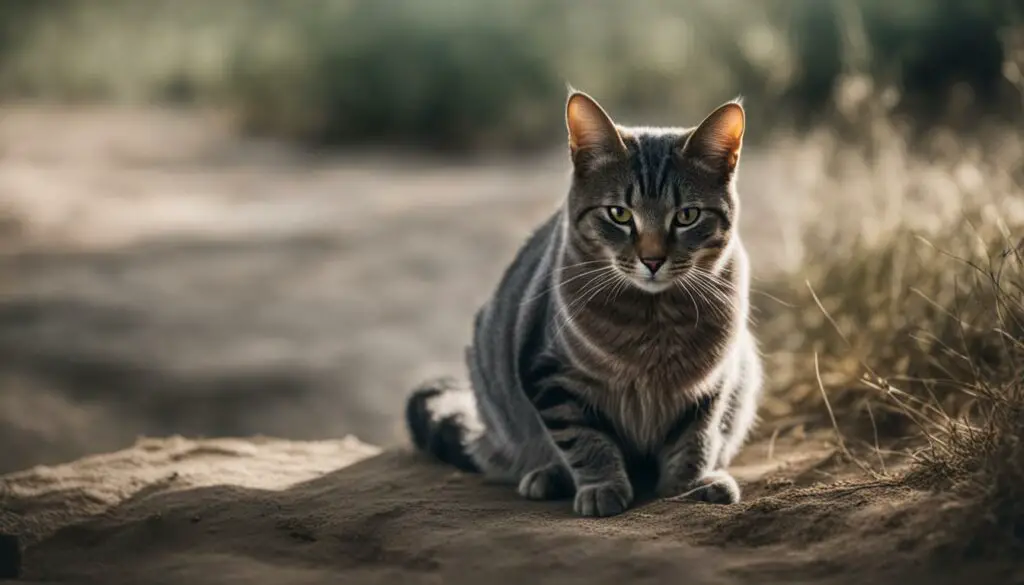
| Signs of Grief in Cats | Description |
|---|---|
| Increased vocalizations | Cats may meow or yowl more than usual, expressing distress and grief. |
| Restlessness | Pacing, wandering aimlessly, and being unable to settle down are common signs of grief in cats. |
| Loss of appetite | Grieving cats may have a decreased interest in food or refuse to eat altogether, leading to weight loss and health issues. |
| Lethargy | Grieving cats may display decreased energy levels and a lack of enthusiasm for activities they previously enjoyed. |
Grieving Process in Cats
The grieving process in cats can be a complex and emotional journey. When a cat loses a companion, they may experience a range of emotions and behaviors as they cope with their loss. Understanding the grieving process in cats is important for providing the necessary support and care during this difficult time.
During the grieving process, cats may go through different stages of mourning. These stages can include denial, anger, sadness, and acceptance. Just like humans, cats may exhibit a variety of behaviors during each stage, such as vocalizations, restlessness, loss of appetite, and changes in litter box habits.
To help a cat cope with loss, it is crucial to provide a comforting and stable environment. Maintaining regular routines and offering extra attention and affection can provide a sense of security. Creating a safe space where the cat can retreat and providing soothing stimuli, such as soft music or familiar scents, can also be beneficial.
If a cat’s grief symptoms persist or worsen over time, it may be necessary to seek professional veterinary support. A veterinarian can assess the cat’s overall well-being and provide guidance on additional measures that may help with the grieving process, such as medication or alternative therapies.
Understanding and supporting a grieving cat requires patience, empathy, and a deep understanding of feline behavior. By providing the necessary support and care, we can help grieving cats navigate through their mourning process and find comfort in their time of loss.
Grief Symptoms in Cats:
- Increased vocalizations
- Restlessness
- Loss of appetite
- Changes in litter box habits
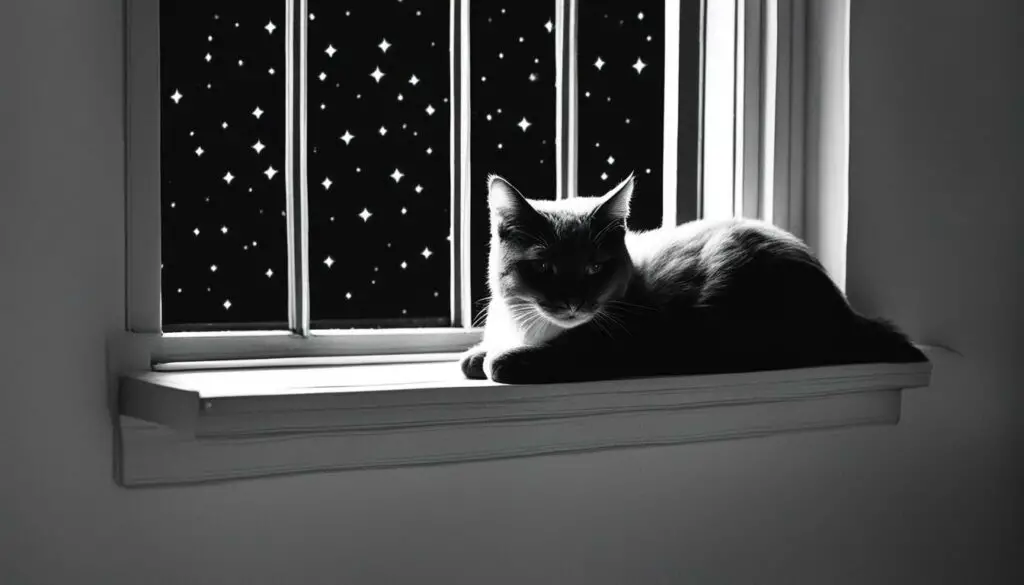
Helping Grieving Cats
Grieving cats require extra attention, comfort, and support to navigate through the loss of a companion. By providing a secure and calm environment, you can help alleviate their distress and promote healing. Here are some ways to assist grieving cats:
- Offering comfort: Create a cozy space with their favorite bedding and toys. Cats may seek solace in familiar scents and objects that remind them of their companion.
- Maintaining routines: Stick to your cat’s daily schedule as much as possible. Consistency can provide a sense of stability and reassurance during the grieving process.
- Monitoring physical health: Keep a close eye on your cat’s overall well-being. If you notice any concerning changes in appetite, weight, or behavior, consult a veterinarian for guidance.
- Seeking veterinary support: Professional guidance can be invaluable for understanding and addressing your grieving cat’s needs. Your veterinarian can offer advice on managing grief-related issues and recommend appropriate interventions or therapies.
Remember, every cat is unique, and their responses to grief may vary. Some cats may require more time and support than others. Be patient, understanding, and compassionate as you assist your feline companion through the mourning process.
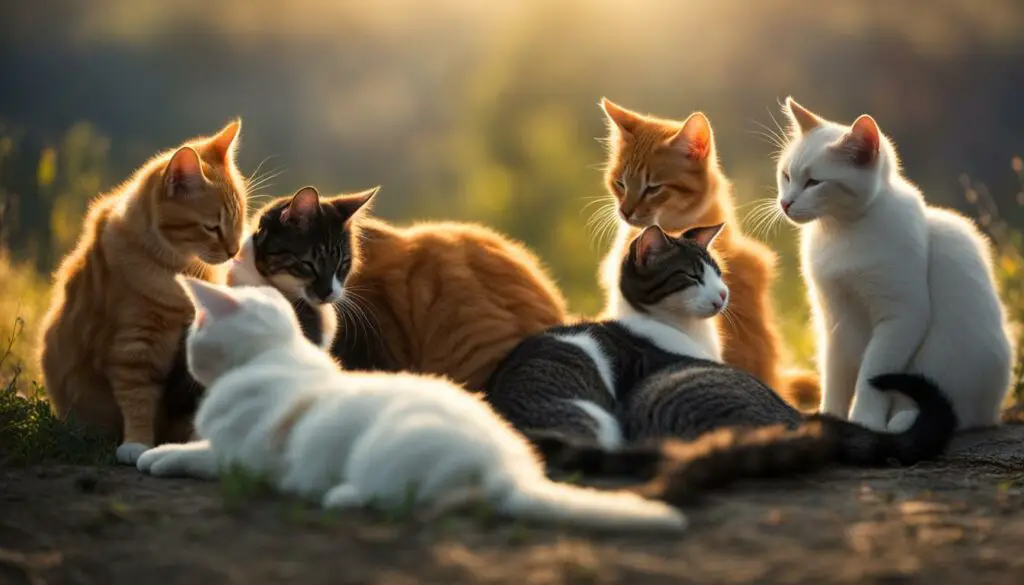
The Signs of Grief in Cats
Grief is a complex emotion that can manifest differently in each individual, including our feline friends. When a cat experiences the loss of a companion, they may exhibit various signs indicating their grief. These signs can provide valuable insight into their emotional state and help us better understand their needs during this difficult time.
| Signs of Grief in Cats | Description |
|---|---|
| Vocalizations | Grieving cats may vocalize more frequently or in a different manner than usual. They may meow plaintively or even howl, expressing their distress and longing for their lost companion. |
| Restlessness | Cats who are grieving may display signs of restlessness. They may pace, wander aimlessly, or have difficulty settling down, reflecting their heightened emotional state. |
| Loss of Appetite | Grief can greatly affect a cat’s appetite. They may show a decreased interest in food or refuse to eat altogether. It’s important to monitor their eating habits and consult a veterinarian if their refusal to eat persists. |
| Litter Box Issues | Some grieving cats may experience changes in their litter box habits. They may urinate outside of the box or even engage in marking behavior as a response to their emotional distress. Providing a calm environment and additional litter boxes can help alleviate these issues. |
It’s important to note that not all cats will exhibit all of these signs, and individual reactions may vary. Some cats may display no outward signs of grief but still experience it internally. By recognizing these signs, we can offer our grieving cats the support and understanding they need during this challenging time.
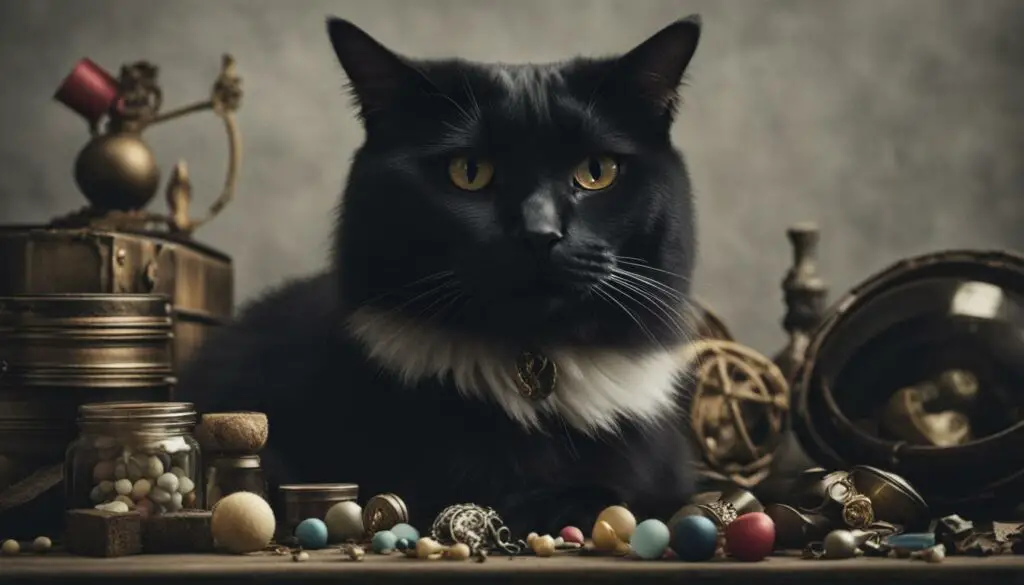
“The loss of a companion can have a profound impact on a cat’s emotional well-being. By understanding the signs of grief and providing appropriate care, we can help our feline friends navigate through their mourning process.”
– Feline Behavior Expert
Understanding Lethargy in Grieving Cats
Grieving cats often experience lethargy, a decreased level of activity that can be noticeable compared to their usual behavior. This lethargy is a common response to the emotional stress and loss they are experiencing. Cats may exhibit signs such as decreased interest in play, sleeping more than usual, and withdrawing from social interactions. It’s important to provide gentle support and understanding during this time, allowing the cat to take the space they need while still monitoring their overall well-being.
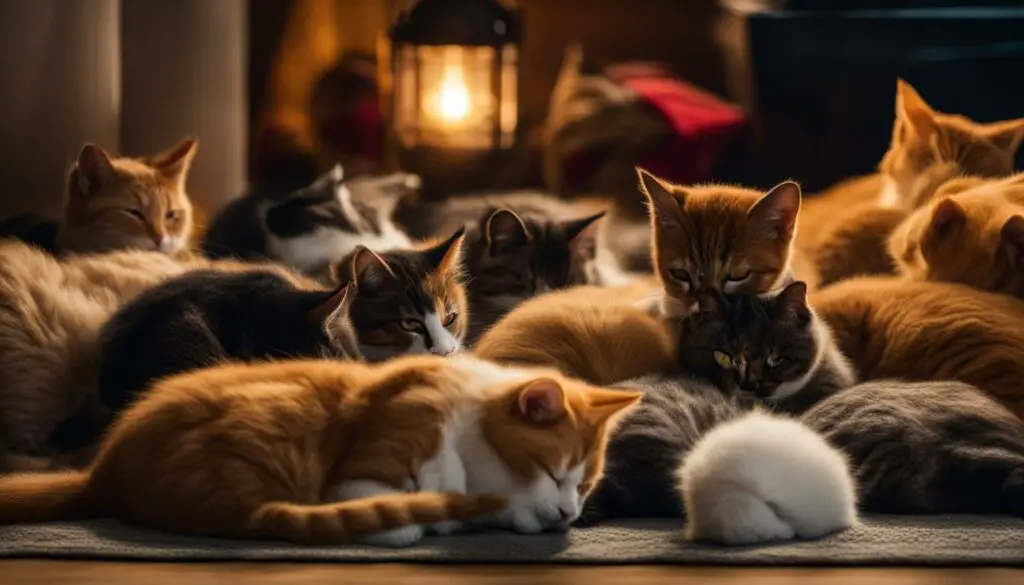
“It’s important to remember that lethargy in grieving cats is an individual response influenced by their unique personality and bond with the lost companion,” says Dr. Emily Thompson, a feline veterinarian.
“During this period of mourning, it’s crucial to maintain a calm and peaceful environment for the cat. Avoid introducing major changes or disruptions that could further contribute to their stress.”
In some cases, the cat may benefit from additional comfort measures such as soft bedding, soothing music, or pheromone diffusers to help create a sense of security.
Caring for a Lethargic Grieving Cat
While a certain level of lethargy is expected in grieving cats, it’s important to monitor for any concerning changes in their behavior or health. If the cat becomes excessively lethargic, shows a loss of appetite, or displays other unusual symptoms, it’s advisable to seek veterinary care.
- Some ways to support a lethargic grieving cat include:
- Creating a quiet and safe space for the cat to retreat to when they need it.
- Offering gentle and affectionate interactions to provide comfort.
- Ensuring that the cat has access to fresh food, water, and a clean litter box.
- Engaging the cat in calm and interactive play sessions to encourage some activity and stimulation.
Remember, each cat’s grieving process is unique, and it’s essential to approach their needs with patience, understanding, and love.
Dealing with Appetite Changes in Grieving Cats
Grieving cats may experience appetite changes, such as a decreased interest in food or a complete loss of appetite. It can be distressing to witness your furry companion’s disinterest in eating, but there are strategies to help encourage them to eat during this challenging time.
First, it’s essential to offer a variety of appealing food options. Some cats may have specific preferences, so providing a selection of wet and dry food flavors can entice them to eat. Additionally, warming the food slightly or adding a small amount of tuna juice can make it more appealing and increase its aroma, attracting the cat’s attention.
Creating a quiet and relaxed eating environment is also crucial. Cats can be sensitive to their surroundings, so providing a calm space away from noise and distractions can help them feel more at ease while eating. Placing their food in a familiar location can offer a sense of comfort and routine.
Monitoring the cat’s weight is important to ensure they are receiving proper nutrition. Regular weigh-ins can help you track any changes and assess the effectiveness of the feeding strategies. If the cat continues to show a decreased appetite or experiences significant weight loss, it is recommended to consult with a veterinarian for further guidance and support.
Table: Tips for Encouraging Appetite in Grieving Cats
| Tip | Description |
|---|---|
| Offer a variety of food options | Provide different flavors and textures to entice the cat’s interest |
| Warm the food slightly | Increasing the food’s temperature can enhance its aroma and appeal |
| Add tuna juice to the food | The strong scent of tuna can attract the cat’s attention |
| Create a calm eating environment | Provide a quiet space free from distractions |
| Monitor the cat’s weight | Regular weigh-ins can help track any changes and assess the effectiveness of feeding strategies |
| Consult with a veterinarian | If the cat’s appetite does not improve or there is significant weight loss, seeking professional advice is recommended |
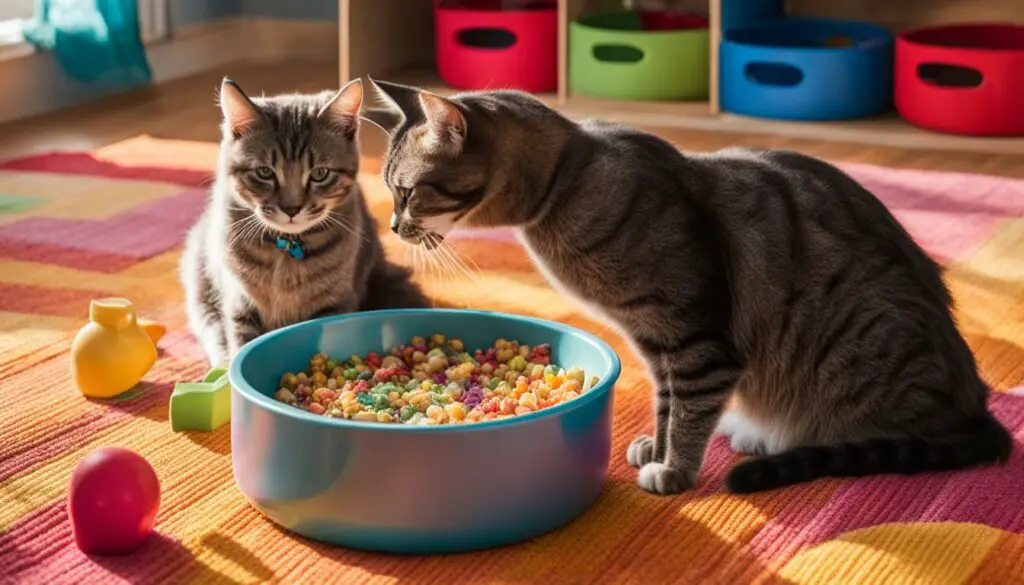
“It can be distressing to witness your furry companion’s disinterest in eating, but there are strategies to help encourage them to eat during this challenging time.”
Addressing Litter Box Issues in Grieving Cats
Grieving cats may exhibit litter box issues as a result of stress and insecurity caused by the loss of a companion. These issues can include inappropriate urination and marking behavior, which can be frustrating for cat owners. Understanding and addressing these litter box issues is essential to help grieving cats navigate through their mourning process.
To address inappropriate urination, it is important to provide multiple litter boxes in quiet areas of the house. Each litter box should be placed in a separate location to give the grieving cat options and a sense of security. Additionally, maintaining a clean litter box environment is crucial, as cats are sensitive to cleanliness and may avoid using a dirty litter box.
Marking behavior, such as spraying urine on vertical surfaces, can be a way for cats to mark their territory and alleviate stress. In these cases, pheromone diffusers can help create a calming environment and reduce the cat’s need to mark. These diffusers emit synthetic pheromones that mimic the ones secreted by cats when they feel safe and secure.
Table: Tips for Addressing Litter Box Issues in Grieving Cats
| Tip | Description |
|---|---|
| Provide multiple litter boxes | Offering multiple litter boxes in quiet areas of the house can give grieving cats a sense of security and options. |
| Maintain cleanliness | Ensure that the litter boxes are kept clean and odor-free to encourage proper litter box usage. |
| Use pheromone diffusers | Pheromone diffusers can help create a calm environment and reduce the cat’s need to mark territory. |
It is important to note that addressing litter box issues in grieving cats may require time and patience. The cat’s mourning process may continue for weeks or even months, and their litter box habits may take time to return to normal. Providing a supportive and understanding environment, along with consistent litter box management, can help grieving cats find comfort and stability during this difficult time.
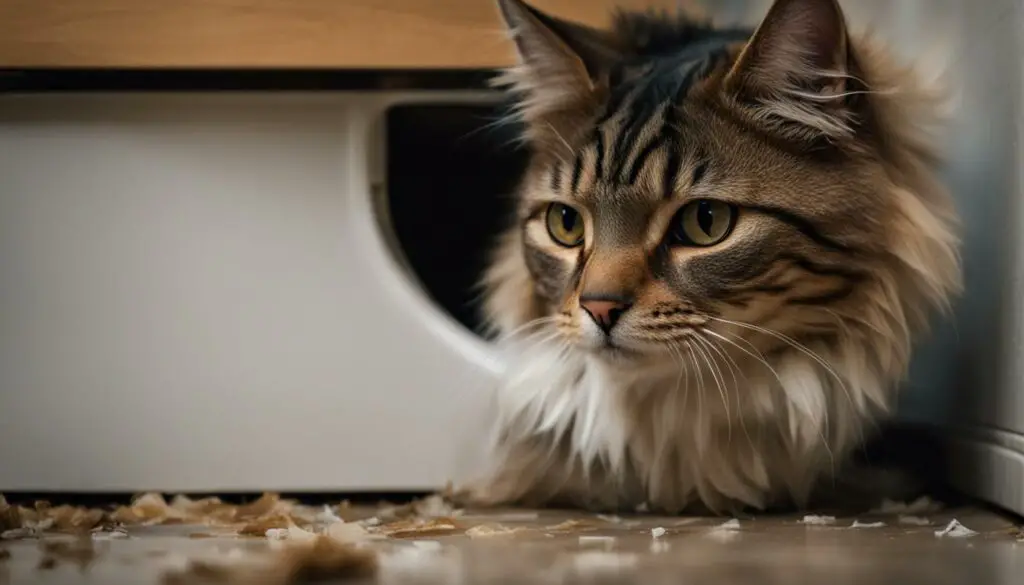
The Role of Personality in Grieving Cats
When it comes to the loss of a companion, cats demonstrate unique and individual responses based on their personality traits. Just like humans, each cat has their own way of processing and coping with grief. While some cats may exhibit clear signs of mourning, others may not show any outward changes in behavior.
Cats with more outgoing and social personalities may experience a more pronounced reaction to the loss of a companion. They may display signs such as increased vocalizations, restlessness, or seeking extra attention from their human caregivers. On the other hand, cats with more introverted or independent personalities may appear less affected by the loss, keeping their routine and behavior relatively unchanged.
It’s important for cat owners to understand and respect these individual differences in grieving cats. Providing support and comfort tailored to each cat’s personality can help them navigate through their mourning process. Whether a cat requires extra attention and reassurance or prefers space and solitude, it’s crucial to honor their unique needs during this difficult time.
In summary, personality plays a significant role in how cats grieve and respond to the loss of a companion. By recognizing and considering these individual differences, cat owners can offer the appropriate support and care needed to help their grieving feline friends cope with their loss.
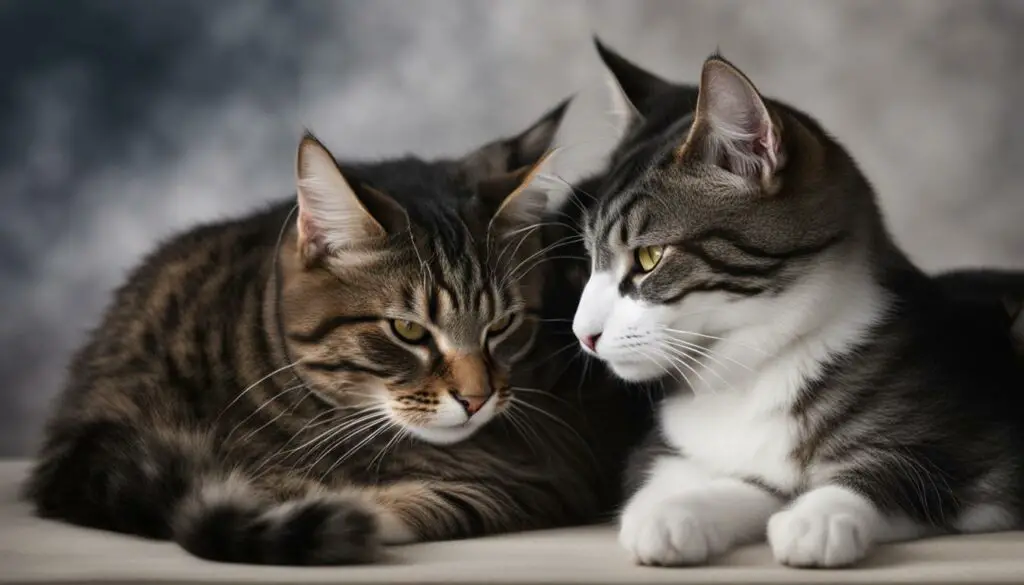
Handling Euthanasia and Pet Loss
The loss of a beloved pet can be an incredibly difficult and emotional experience for both humans and their feline companions. Understanding a cat’s response to death and handling the process of euthanasia is crucial in providing support and comfort during this challenging time.
Cats are perceptive creatures and can often sense when another pet is nearing the end of their life. They may exhibit signs of distress, such as increased vigilance or staying close to their ailing companion. Allowing them to see and interact with the deceased pet, if they show an interest, can help them understand and process the loss.
It is important to consider each individual cat’s temperament and comfort level when it comes to euthanasia and pet loss. Some cats may find comfort in spending time with their deceased companion, while others may become anxious or upset. Providing a safe and quiet space for grieving, offering gentle reassurance, and allowing the cat to dictate their own reactions can help them navigate through this difficult time.
| Table: Suggestions for Handling Euthanasia and Pet Loss |
|---|
| 1. Create a calm and comfortable environment: Ensure that the cat has a quiet and safe space where they can retreat and process their emotions. |
| 2. Offer gentle reassurance and comfort: Provide extra attention and affection to the grieving cat, offering physical comforts like soft blankets or soothing scents. |
| 3. Allow the cat to grieve in their own way: Respect their need for solitude or closeness, and let them dictate how much interaction they desire. |
| 4. Seek support if needed: If the grieving process seems prolonged or the cat is showing signs of distress, consult with a veterinarian or a professional who specializes in pet bereavement for guidance. |
| 5. Consider memorializing the deceased pet: Creating a tribute or memorial for the lost pet, such as a photo collage or a planting a memorial tree, can help both humans and cats in the grieving process. |
Understanding and supporting a cat’s response to euthanasia and pet loss is a deeply personal and individual experience. By providing a calm and comforting environment, offering reassurance and respect, and seeking support if needed, we can help our grieving feline friends navigate through their mourning process with love and understanding.
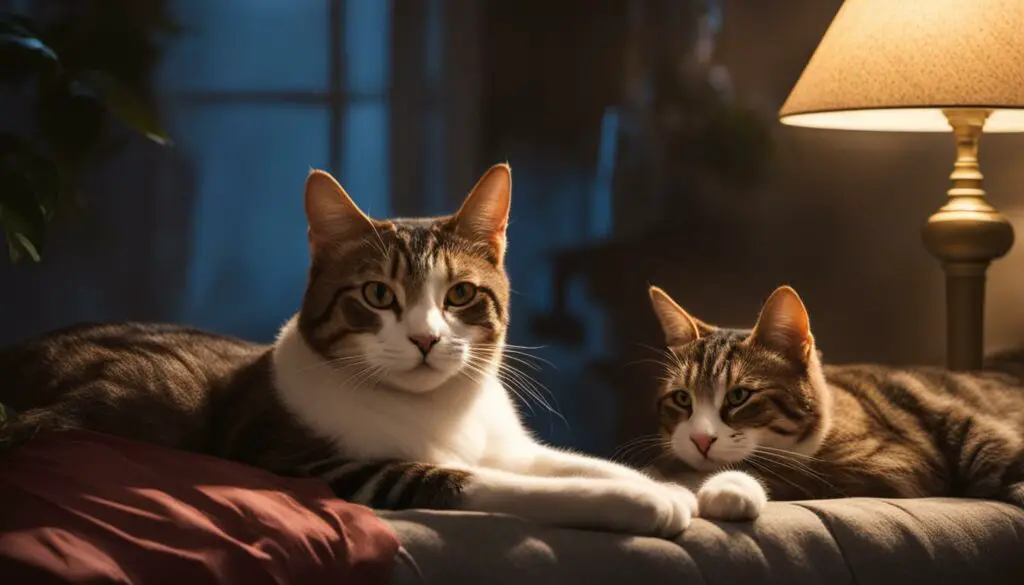
Considering Getting Another Pet
After the loss of a beloved feline companion, many pet owners may find themselves contemplating whether to bring another pet into their lives. The decision to get another pet after a loss is a deeply personal one, and it should be carefully considered to ensure it is the right choice for both the owner and the remaining cat.
Introducing a new companion can have both positive and negative impacts on a grieving cat. On one hand, a new pet can provide companionship and help alleviate feelings of loneliness and grief. It can also serve as a distraction and bring joy back into the household. On the other hand, some cats may be resistant to change or may not be ready for a new companion. It is important to assess the remaining cat’s temperament and comfort level before introducing a new pet.
When considering getting another pet, it is crucial to think about the dynamics of the household. If the remaining cat had a close bond with the deceased companion, introducing a new pet too soon may cause stress and confusion. It is recommended to wait until the grieving cat has had enough time to adjust and heal before introducing a new companion. Additionally, the age and personality of the remaining cat should be taken into account. Some cats may prefer the company of a younger or older pet, while others may thrive with a similar-aged companion.
Ultimately, the decision to get another pet after the loss of a companion should be based on the well-being and happiness of both the owner and the remaining cat. It is important to remember that grief is a natural and individual process for both humans and animals. Taking the time to assess the needs and feelings of the grieving cat will help ensure a smooth transition and the best possible outcome for everyone involved.
Conclusion
Cats are incredibly sensitive and form deep emotional bonds with their feline companions. When another cat is dying, they can perceive and react to the loss, experiencing grief in their own unique way. It’s important for cat owners to understand and support their grieving cats during these difficult times.
Research has shown that cats exhibit signs of grief, such as changes in behavior and appetite. Increased vocalizations, restlessness, and litter box issues are common manifestations of their sorrow. Cats may also become lethargic and withdraw from social interactions as they process the loss.
To support grieving cats, it’s crucial to create a safe and calm environment. Maintaining routines, offering extra attention, and providing comfort can help them navigate through the grieving process. Regular veterinary check-ups are also essential to ensure their physical well-being during this sensitive time.
In conclusion, cats do know when another cat is dying, and they experience grief and loss. By providing understanding, support, and veterinary care, we can help our feline friends cope with the loss of a companion and offer them the comfort they need.
FAQ
Do cats know when another cat is dying?
Yes, cats have a deep emotional bond with their fellow feline companions and can perceive when another cat is dying.
How do cats communicate and connect with each other?
Cats communicate through body language, vocalizations, and scent markings, creating an emotional connection with their companions.
What are the signs of decline in cats?
Signs of decline in cats can include changes in appetite, weight loss, lethargy, decreased grooming, and changes in litter box habits.
Do cats experience grief?
Yes, cats experience grief after the loss of a companion and may exhibit behavioral changes such as increased vocalizations, restlessness, loss of appetite, lethargy, and litter box issues.
How long does the grieving process last in cats?
The grieving process in cats can vary in duration and intensity, with some cats grieving for a few days and others taking weeks or months to fully process the loss.
How can I help a grieving cat?
You can help a grieving cat by providing extra attention, creating a secure space, maintaining familiar routines, and monitoring their physical health.
What are the signs of grief in cats?
Signs of grief in cats can include increased vocalizations, restlessness, loss of appetite, and changes in litter box habits.
Why is my grieving cat lethargic?
Lethargy is a common sign of grief in cats, and they may become less interested in play, sleep more than usual, and withdraw from social interactions.
What should I do if my grieving cat has a decreased appetite?
If your grieving cat has a decreased appetite, try offering a variety of appealing food options, providing a quiet eating environment, and monitoring their weight to ensure proper nutrition.
How do I address litter box issues in a grieving cat?
You can address litter box issues in a grieving cat by providing multiple litter boxes in quiet areas and using pheromone diffusers to alleviate stress and insecurity.
Do all cats grieve in the same way?
Each cat has a unique personality, and their response to the loss of a companion can vary. Some cats may display clear signs of grief, while others may show no outward changes in behavior.
How should I handle euthanasia and pet loss?
Handling euthanasia and pet loss involves understanding a cat’s response to death and providing support and comfort during this difficult time.
Should I consider getting another pet after the loss of a companion?
Deciding to get another pet after the loss of a companion depends on various factors, including the remaining cat’s personality, relationship with other animals, and age.
What is the conclusion regarding cats and grief?
Cats are capable of experiencing grief and loss when a companion cat is dying. Providing support, understanding, and veterinary care if needed can help grieving cats navigate through their mourning process.

